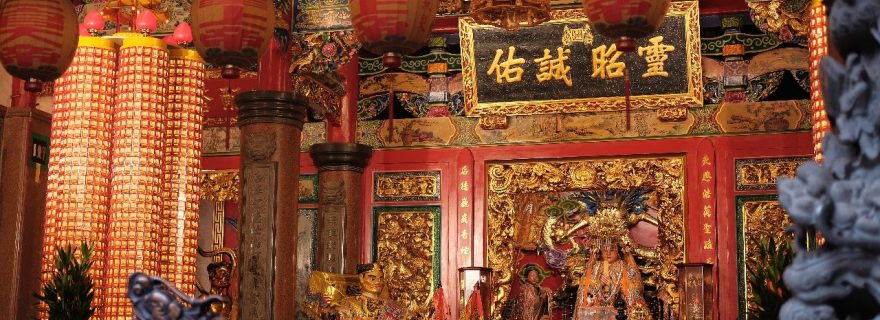Can the Might of a Taiwanese Goddess Prevent you from Getting the Virus?
In February, both proponents and opponents of the postponement of one of Taiwan’s largest religious parades framed their arguments in spiritual terms. Fang-I Chu describes her amazement at the creativity of Han-Chinese Folk religion in Taiwan.
Mass-gathering religious events worldwide are canceled due to the global COVID-19 pandemic. Taiwan is not an exception. March would have been a busy month for many Taiwanese people as they would celebrate the birthday of a famous Goddess: Mazu. As the Goddess of marine navigation and good weather, Mazu has believers spread throughout the East and South-East Asian region. Idols of Mazu are worshiped in households and local temples. In many Mazu temples, each idol is considered an independent spirit, and these spirits are regarded as “sisters”. Since 1980, Taiwanese believers have held parades to celebrate Mazu’s birthday, in which they carry the idol of the local Mazu and let the “sisters” visit each other’s temple.
The Mazu parade and Covid-19: opinions and controversies
For those Mazu temples with great reputations, the parade could last more than a week, with thousands of people joining in the celebrations. In Taiwan, one of the largest parades is usually organized by a Mazu temple in Dajia, a coastal district in Taichung County. In 2019 around 400,000 believers joined the parade; they carried Dajia Mazu’s idol in a delicate sedan chair, and walked for 340 kilometers to visit other Mazu temples in different counties. It is believed that during the parade, Dajia Mazu delivers her blessing to all the pilgrims, volunteers, and tourists.
In February 2020, public debates sparked upon the question of whether such a parade should continue. The risk of cluster transmission of the COVID-19 virus would be high because hundreds of people would walk, eat, and even sleep together in crowded circumstances for more than a week. Thousands of believers would also be eager to touch Dajia Mazu’s sedan chair or to kneel and let the sedan chair pass over their bodies. Dajia Mazu Jenn Lann Temple Foundation was initially not willing to postpone the parade. On the 16 th of February, the foundation declared: “Don’t panic. [Dajia] Mazu will protect everyone.” Even after heavy critique from the Taiwanese public and several public health professionals, the foundation still insisted that the parade “will be held as scheduled”, though it promised to scale down the number of participants.
Why did the foundation hesitate? Various Taiwanese news media and the BBC news suggested that the Dajia Mazu parade, besides delivering blessings, also brings in huge amounts of business opportunities. The postponement of the event would mean an enormous financial loss for transportation, food, and advertising industries as well as vendors of essential worship tools. In addition, the Dajia Mazu Temple itself would also lose out on the donations from believers and pilgrims usually given during the event. These donations are either done in cash or by gold medals and could easily be worth 10 million of New Taiwan dollars (about 300 thousand euros) in total. On a deeper level, the coronavirus not only affects the Dajia Mazu Temple’s economic thrift but could also disturb its political power. Temples are deeply involved in Taiwan’s local politics and are an important platform of negotiation for local headmen. Large religious events like the Mazu parade are important means for temples to exhibit their power, and politicians are always more than willing to show up at the event.
Would Mazu’s blessing be strong enough to overcome the virus?
Tensions increased between the Taiwanese health ministry and the foundation. While most public health officials agreed that it would be too risky for such a mass-gathering to continue, there are legal barriers to banning religious activities in a democratic society. Therefore, the ministry’s pressure to postpone the event was framed in a religious way. Politicians and citizens who wished the parade halted did not criticize the foundation directly but reinterpreted Mazu’s blessing. Phrases like “Mazu will hope everyone takes health as their highest priority” or “don’t force Mazu to bless those who put themselves at risk” were spreading both on public and social media. Some netizens even proposed an activity on Facebook called “Ask Mazu for some days off”, saying that “Mazu will understand our absence”. About 16,000 people were interested in this activity. The foundation cannot object to these alternative practices of worship, because Han-Chinese folk religion, which has no scriptures or dogmas, is highly decentralized. Believers may not fully understand the foundation’s economic/political power, but they still feel free to discuss and practice what is for them the most suitable worship. On the 27 th of February, the foundation gave in and announced that the parade would be postponed.
COVID-19 casts its shadow on the Dajia Mazu parade, connecting a religious journey of prosperity and blessing to substantial health risks. The foundation’s initial announcement of “Mazu will protect everyone” is not only simply a superstitious statement. It also reflected the foundation’s attempt to prevent Dajia Mazu‘s economic/political power from being damaged by the virus. However, many believers, who also have faith in Mazu, are reinterpreting Mazu’s blessings differently and even mobilizing religious language to justify public health precautions. Alternative practices of worship already exist in Han-Chinese folk religion, and the COVID-19 pandemic has amplified debates between its different groups.



0 Comments
Add a comment